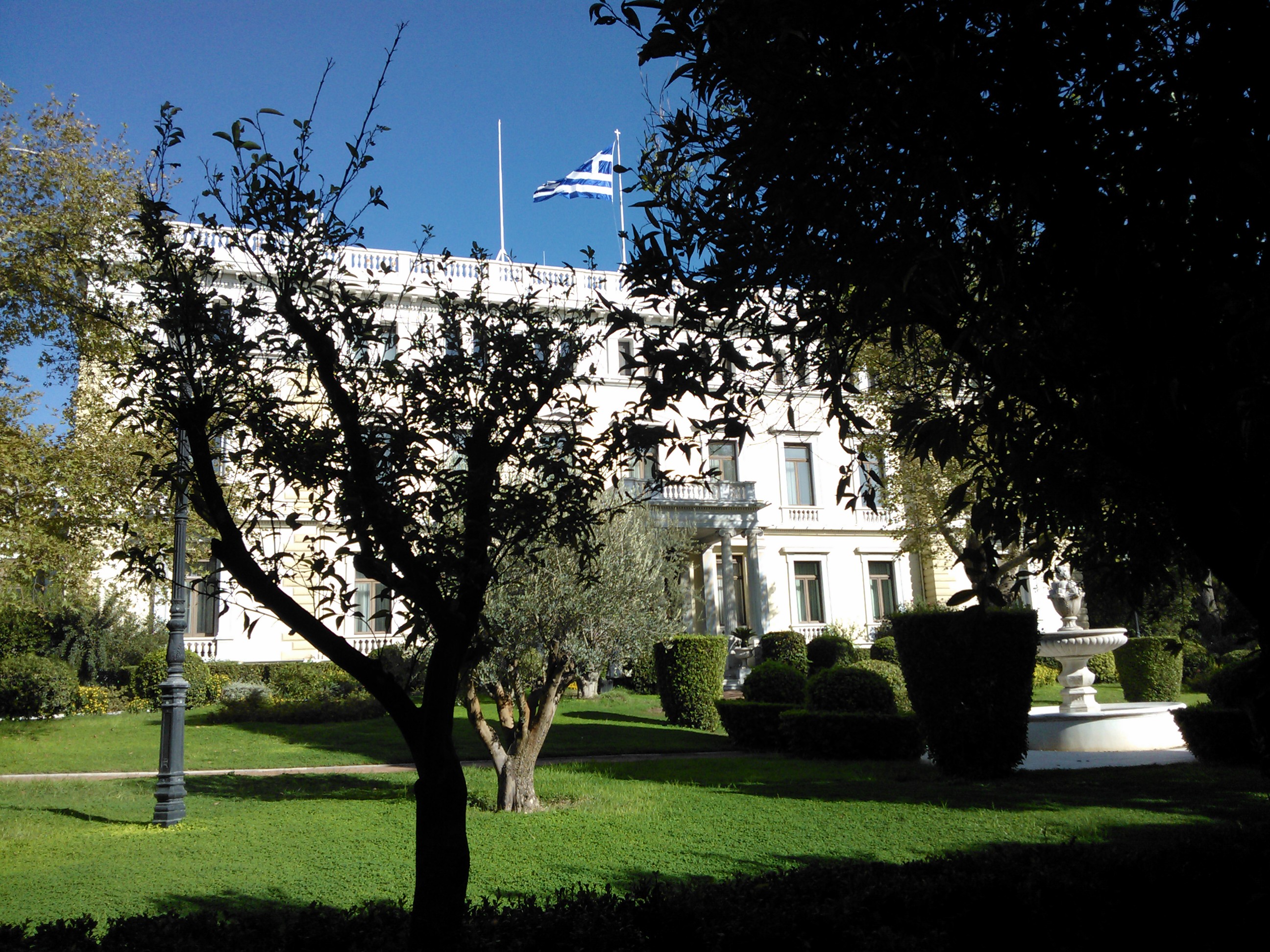|
Theodoros Pangalos (general)
Lieutenant General Theodoros Pangalos (; 11 January 1878 – 26 February 1952) was a Greek general, politician and dictator. A distinguished staff officer and an ardent Venizelist and anti-royalist, Pangalos played a leading role in the September 1922 revolt that deposed King Constantine I and in the establishment of the Second Hellenic Republic. In June 1925 Pangalos staged a bloodless coup, and his assumption of power was recognized by the National Assembly which named him Prime Minister. As a " constitutional dictator" he ruled the country until his overthrow in August 1926. From April 1926 until his deposition, he also occupied the office of President of the Republic. Pangalos withdrew from public life for a while, but remained active in the Venizelist military circles. During the Axis Occupation of Greece, Pangalos and military officers close to him played a role in the establishment of the Security Battalions. He was widely suspected of collaboration with the Germans. C ... [...More Info...] [...Related Items...] OR: [Wikipedia] [Google] [Baidu] |
President Of Greece
The president of Greece, officially the President of the Hellenic Republic ( el, Πρόεδρος της Ελληνικής Δημοκρατίας, Próedros tis Ellinikís Dimokratías), commonly referred to in Greek as the President of the Republic ( el, Πρόεδρος της Δημοκρατίας, Próedros tis Dimokratías), is the head of state of Greece. The president is elected by the Hellenic Parliament; the role has been mainly ceremonial since the 1986 constitutional reform. The office was formally established by the Constitution of Greece in 1975, but has antecedents in the Second Hellenic Republic of 1924–1935 and the Greek junta in 1973–1974 which predated the transition to the current Third Hellenic Republic. The incumbent, since 13 March 2020, is Katerina Sakellaropoulou. Powers The president is the nominal commander-in-chief of the Greek Armed Forces and occupies the first place in the country's order of precedence. Although the Greek Constitution of 1 ... [...More Info...] [...Related Items...] OR: [Wikipedia] [Google] [Baidu] |
First Balkan War
The First Balkan War ( sr, Први балкански рат, ''Prvi balkanski rat''; bg, Балканска война; el, Αʹ Βαλκανικός πόλεμος; tr, Birinci Balkan Savaşı) lasted from October 1912 to May 1913 and involved actions of the Balkan League (the Kingdoms of Kingdom of Bulgaria, Bulgaria, Kingdom of Serbia, Serbia, Kingdom of Greece, Greece and Kingdom of Montenegro, Montenegro) against the Ottoman Empire. The Balkan states' combined armies overcame the initially numerically inferior (significantly superior by the end of the conflict) and strategically disadvantaged Ottoman armies, achieving rapid success. The war was a comprehensive and unmitigated disaster for the Ottomans, who lost 83% of their European territories and 69% of their European population. [...More Info...] [...Related Items...] OR: [Wikipedia] [Google] [Baidu] |
Legion Of Honour
The National Order of the Legion of Honour (french: Ordre national de la Légion d'honneur), formerly the Royal Order of the Legion of Honour ('), is the highest French order of merit, both military and civil. Established in 1802 by Napoleon, Napoleon Bonaparte, it has been retained (with occasional slight alterations) by all later French governments and regimes. The order's motto is ' ("Honour and Fatherland"); its Seat (legal entity), seat is the Palais de la Légion d'Honneur next to the Musée d'Orsay, on the left bank of the Seine in Paris. The order is divided into five degrees of increasing distinction: ' (Knight), ' (Officer), ' (Commander (order), Commander), ' (Grand Officer) and ' (Grand Cross). History Consulate During the French Revolution, all of the French Order of chivalry, orders of chivalry were abolished and replaced with Weapons of Honour. It was the wish of Napoleon, Napoleon Bonaparte, the French Consulate, First Consul, to create a reward to commend c ... [...More Info...] [...Related Items...] OR: [Wikipedia] [Google] [Baidu] |
Legion Honneur Chevalier Ribbon
Legion may refer to: Military * Roman legion, the basic military unit of the ancient Roman army * Spanish Legion, an elite military unit within the Spanish Army * Legion of the United States, a reorganization of the United States Army from 1792 to 1796 * French Foreign Legion, a part of the French Army, created for foreign nationals willing to serve in the French Armed Forces * International Legion of Territorial Defense of Ukraine, a Ukrainian foreign volunteer wing of the 2022 Russo-Ukrainian war * Various military legions, often composed of soldiers from a specific ethnic, national, religious or ideological background * HMS ''Legion'' (1914), a Royal Navy World War I destroyer * HMS ''Legion'' (G74), a Royal Navy World War II destroyer sunk in 1942 Veterans' organizations * American Legion, an organization of American veterans * The Royal British Legion, a UK charity providing support for members of the British Armed Forces and their dependents * Royal Canadian Legion, ... [...More Info...] [...Related Items...] OR: [Wikipedia] [Google] [Baidu] |
War Cross (Greece)
The War Cross ( el, Πολεμικός Σταυρός) is a military decoration of Greece, awarded for heroism in wartime to both Greeks and foreign allies. There have been three versions of the cross, the 1917 version covering World War I, the 1940 version covering the Second World War and the Greek Civil War, and the 1974 version covering peacekeeping missions in the subsequent years. 1917 version Establishment and history The first version was established by the Venizelist "National Defence" Government on 28 February 1917, and confirmed by Royal Decree on 31 October, shortly after the entry of the whole of Greece in the First World War. Its creation was inspired by the French ''Croix de guerre'', and it was awarded to military personnel of all branches for acts of valour in the Macedonian front (1916–1918), the Allied Expedition to the Ukraine (1919) and the Greco-Turkish War of 1919–1922 (rarely after 1920 due to its Venizelist connotations). In addition, from 1919, ... [...More Info...] [...Related Items...] OR: [Wikipedia] [Google] [Baidu] |
GRE War Cross 1940 Ribbon
The Graduate Record Examinations (GRE) is a standardized test that is an admissions requirement for many graduate schools in the United States and Canada and a few other countries. The GRE is owned and administered by Educational Testing Service (ETS). The test was established in 1936 by the Carnegie Foundation for the Advancement of Teaching. According to ETS, the GRE aims to measure verbal reasoning, quantitative reasoning, analytical writing, and critical thinking skills that have been acquired over a long period of learning. The content of the GRE consists of certain specific algebra, geometry, arithmetic, and vocabulary sections. The GRE General Test is offered as a computer-based exam administered at testing centers and institution owned or authorized by Prometric. In the graduate school admissions process, the level of emphasis that is placed upon GRE scores varies widely between schools and departments within schools. The importance of a GRE score can range from being ... [...More Info...] [...Related Items...] OR: [Wikipedia] [Google] [Baidu] |
Order Of The Redeemer
The Order of the Redeemer ( el, Τάγμα του Σωτήρος, translit=Tágma tou Sotíros), also known as the Order of the Saviour, is an order of merit of Greece. The Order of the Redeemer is the oldest and highest decoration awarded by the modern Greek state. Establishment The establishment of the Order of the Redeemer was decided by the Fourth National Assembly at Argos in 1829, during the final year of the Greek War of Independence. The decision was not immediately implemented, however, and the relevant decree was signed in Nafplio by the Regency Council (Josef Ludwig von Armansperg, Karl von Abel and Georg Ludwig von Maurer) in the name of King Otto on May 20, 1833.Government Gazette 19, issue A, dated 20 Jan. 1833 According to the decree of establishment, the name of the Order "shall recall the, by divine assistance miraculously and fortuitously accomplished, salvation of Greece". Grades and award criteria Since its establishment in 1833, and in common with all Gre ... [...More Info...] [...Related Items...] OR: [Wikipedia] [Google] [Baidu] |
Order Of The Redeemer Ribbon Bar
Order, ORDER or Orders may refer to: * Categorization, the process in which ideas and objects are recognized, differentiated, and understood * Heterarchy, a system of organization wherein the elements have the potential to be ranked a number of different ways * Hierarchy, an arrangement of items that are represented as being "above", "below", or "at the same level as" one another * an action or inaction that must be obeyed, mandated by someone in authority People * Orders (surname) Arts, entertainment, and media * ''Order'' (album), a 2009 album by Maroon * "Order", a 2016 song from ''Brand New Maid'' by Band-Maid * ''Orders'' (1974 film), a 1974 film by Michel Brault * ''Orders'', a 2010 film by Brian Christopher * ''Orders'', a 2017 film by Eric Marsh and Andrew Stasiulis * ''Jed & Order'', a 2022 film by Jedman Business * Blanket order, purchase order to allow multiple delivery dates over a period of time * Money order or postal order, a financial instrument usually in ... [...More Info...] [...Related Items...] OR: [Wikipedia] [Google] [Baidu] |
World War II
World War II or the Second World War, often abbreviated as WWII or WW2, was a world war that lasted from 1939 to 1945. It involved the vast majority of the world's countries—including all of the great powers—forming two opposing military alliances: the Allies and the Axis powers. World War II was a total war that directly involved more than 100 million personnel from more than 30 countries. The major participants in the war threw their entire economic, industrial, and scientific capabilities behind the war effort, blurring the distinction between civilian and military resources. Aircraft played a major role in the conflict, enabling the strategic bombing of population centres and deploying the only two nuclear weapons ever used in war. World War II was by far the deadliest conflict in human history; it resulted in 70 to 85 million fatalities, mostly among civilians. Tens of millions died due to genocides (including the Holocaust), starvation, ma ... [...More Info...] [...Related Items...] OR: [Wikipedia] [Google] [Baidu] |
Greco-Turkish War (1919-1922)
{{Disambiguation ...
There have been several Greco-Turkish Wars: *Greek War of Independence (1821–1830), against the Ottoman Empire *Undeclared war in 1854 during the Crimean War, with Greek irregulars invading Ottoman Epirus (Epirus Revolt of 1854) and Thessaly * First Greco-Turkish War (1897) *Greek front of the First Balkan War (1912–13) * Second Greco-Turkish War (1919–1922), also called the ''Asia Minor Campaign'' or the ''Western Front'' of the Turkish War of Independence This term may also refer to the medieval predecessor civilisations of Greece and Turkey: * Byzantine–Seljuk wars * Byzantine–Ottoman wars See also *Aegean dispute *Greece–Turkey relations *Turkish invasion of Cyprus The Turkish invasion of Cyprus began on 20 July 1974 and progressed in two phases over the following month. Taking place upon a background of Cypriot intercommunal violence, intercommunal violence between Greek Cypriots, Greek and Turkish ... [...More Info...] [...Related Items...] OR: [Wikipedia] [Google] [Baidu] |
Macedonian Front
The Macedonian front, also known as the Salonica front (after Thessaloniki), was a military theatre of World War I formed as a result of an attempt by the Allied Powers to aid Serbia, in the autumn of 1915, against the combined attack of Germany, Austria-Hungary and Bulgaria during World War I, Bulgaria. The expedition came too late and in insufficient force to prevent the fall of Serbia, and was complicated by the internal political crisis in Kingdom of Greece, Greece (the "National Schism"). Eventually, a stable front was established, running from the Albanian Adriatic Sea, Adriatic coast to the Struma River, pitting a Allied Army of the Orient, multinational Allied force against the Bulgarian Army, which was at various times bolstered with smaller units from the other Central Powers. The Macedonian front remained quite stable, despite local actions, Vardar offensive, until the great Allied offensive in September 1918, which resulted in the capitulation of Bulgaria and the libe ... [...More Info...] [...Related Items...] OR: [Wikipedia] [Google] [Baidu] |


